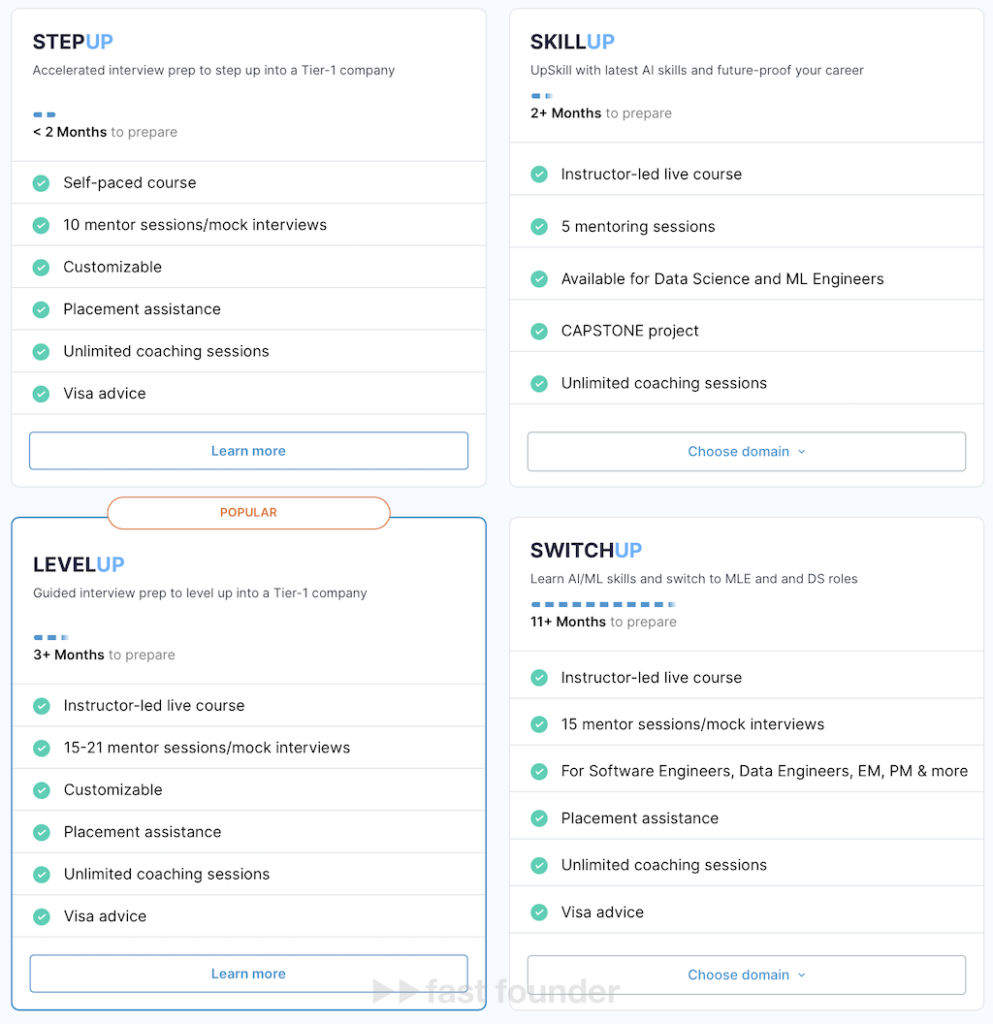- Many educational startups inexplicably prefer to create courses for beginners. However, courses for professionals are more profitable because they can be priced higher. The main offer here is not “get into the profession” but “earn more.”
- However, simply selling “professional development” to professionals is not feasible. After all, if they are truly professionals, they already know how to learn on their own 😉 So, something else needs to be sold under a different guise.
- And here is a startup that has mastered this. Moreover, it has long been profitable, and it has now raised investments to earn even more.
Project Overview

Interview Kickstart doesn’t seem to offer anything particularly special—it’s a fairly typical set of educational courses for training in various computer specialties.

However, even the name of the service implies that the goal of education is not just to learn something, but to successfully pass a job interview 😉

To achieve this, firstly, the service offers instructors and mentors from among the current employees of top technology companies like Google, LinkedIn, Airbnb, and the like. Currently, the service collaborates with over 500 such experts.

Secondly, in addition to studying the chosen specialty, the training program includes separate lessons on career development, salary negotiation, and individual feedback on the topics being studied.
Moreover, the service’s experts conduct mock interviews with students to prepare them for the interview environment and style. Another goal of these simulations is to identify topics and questions where students tend to “struggle” during such interviews, so they can work on them separately.

All programs are divided into 4 levels:
Quickly get prepared for an interview in less than 2 months. At this level, the student only studies pre-recorded lessons, but the course includes mentor support and mock interviews. Advance your skills in 2 or more months. At this level, lessons are already conducted live. However, there are no mock interviews here because the main goal of the course is to enhance skills for current work. Prepare for an interview at a top technology company. These courses last for at least 3 months and include not only mock interviews but also advice on obtaining work visas. Transition to work in AI, machine learning, and data analysis fields. Such courses last for at least 11 months and also include mock interviews and advice on obtaining work visas. The courses are not cheap—their price ranges from $2,500 to $10,000 depending on the level and specialty.

Interview Kickstart was founded back in 2014. It became profitable without any investments. Over this time, more than 17,000 students have completed its courses, managing to increase their salaries by an average of 66.5% after graduation.
The highest salary achieved by a course graduate was $1.2 million per year. On average, however, a course graduate receives 18 job offers.

Now Interview Kickstart has decided to attract investments for more active promotion and expansion of its activities—and has raised $10 million from an Indian venture fund. This was prompted by the service’s decision to test India as its second target market since 98% of its revenue currently comes from the USA.
What’s Interesting
Interview Kickstart has decided to step up its efforts because demand for its courses has sharply increased. Since 2014, about 20,000 students have enrolled, but 5,000 of them have done so in the last 12 months alone.

One of the reasons is the introduction of a new line of courses aimed at transitioning from “regular” programming to working in AI, machine learning, and data analysis fields. The startup launched this line of courses just a year ago, but during this time, 2,000 students have already completed or are still studying in the courses.

The specificity of the service is that it does not target beginners who want to learn programming “from scratch.” Their main target audience is professionals with 5 to 20 years of work experience who cannot afford to stop working. Therefore, the courses and mentor sessions are held only in the evenings and on weekends—so that students can learn without taking time off from work.

Consequently, the main goal of education is not to get any job, but to get a better job at a higher-level company—where they can pay 2–3 times more for the same work, but only to specialists of the appropriate level for such companies.

Thus, the main offer is not “find a job,” like many professional training courses, but “increase your salary.” Here, the startup actually talks about an average salary increase of 53% for graduates, although it mentions 66.5% on the homepage. But the essence of the offer remains the same.

Moreover, such salary increases over a short period are possible if the graduate really manages to move to a top position in a top company—which, among other things, requires learning how to pass interviews for such positions in such companies 😉
An additional perk for future students—the startup promises to refund 50% of the money paid by the student if they diligently studied, successfully passed all mock interviews, but failed to find a job within a certain period after graduation.

In general, it is worth noting that “successful interview passing,” rather than “learning something,” is gradually becoming a popular offer for computer courses.

This is how Indian startup InterviewBit operates, for example. It raised $66.5 million in investments.

The startup Formation, promoted a fairly general offer of “career development” for programmers. But now, it also writes about interview preparation, even using AI. It raised $5 million in investments.

There is even a startup called Interviewing—they don’t teach anything at all but sell the opportunity to undergo mock interviews with experts from top technology companies.
In 2021, their interviews cost from $120—and now, they start from $225. So, this service turns out to be in demand and increasing in price 😉
Where to Head
The first general conclusion is that you should always sell not the process but the result. Not just learning something, but successfully passing an interview, as in the example of the startups mentioned above.
In connection with this, the question arises: what are you selling or planning to sell in your startup? The process or the result? If it’s the process, it needs to be corrected 😉
The second conclusion concerns the fact that many startups in the field of professional education focus on beginners under the slogan “get into tech” or something similar.
Although another interesting topic is educational startups that help advance the careers of established professionals. If we take the example of today’s Interview Kickstart: a) transition to a higher-level company to earn more while doing the same thing, or b) switch specialties (for example, to AI) to also earn more.
Therefore, the main direction of possible movement related to education is the creation of platforms and services for training professionals to help them earn more.
An important point is that you cannot narrowly focus on “improving professional qualifications.” After all, if someone is truly a professional, they can learn new professional skills themselves—crutches in the form of such courses are not really needed for a true professional.
Therefore, the focus should be on aspects that professionals would find difficult to master alone. Passing interviews at companies of a fundamentally different level is one such aspect. A professional can switch to a new adjacent specialty independently, but it will take significantly longer.
A key feature of courses for professionals is that you can charge more for them than for beginners 😉 This is because professionals already earn decent money, while beginners usually do not. That’s why, although the cost of Interview Kickstart courses ranges from $2,500 to $10,000, their demand is only increasing.
Earning more money per student is good. At the very least, it allows not burning money on essentially worthless traffic that still needs to be converted into purchases to achieve a large enough number of students for acceptable earnings. Or it allows not putting students into debt by setting prices that are unaffordable for them.
But the most important thing is that high but accessible fees for professionals allow spending enough time and effort on each student so that they can achieve their goals without the provider being at a loss. And the more students achieve their goals, the more new students we can attract based on these successful examples.

It’s interesting that “advancing careers” can be done not only in technological fields. The startup Escalate, which focuses on advancing the careers of “blue-collar workers.” Roughly speaking—from a waiter to a shift supervisor, from a salesperson to a senior salesperson, and so on. This startup raised $1.4 million in investments.
The trick is that companies have two problems. First, entry-level employees often quit too often because they don’t see any prospects at their current level. Second, companies have no one to hire for positions at the next level of lower-level managers because they need not only professional experience but also people skills and a higher level of responsibility—so it’s difficult to find such employees through job postings.
Escalate helps companies establish a two-year process of preparing entry-level employees for such promotions, which ultimately leads, on the one hand, to a decrease in turnover of entry-level employees, and on the other hand, to filling vacancies at the next level.
So, there are many options and opportunities in courses “for advancement.” But first, you need to answer a few questions. In what field will we target professionals? What can lead to a significant increase in their earnings? What of this would be difficult for a real professional to learn independently for objective reasons? How can we help them learn this?
About the Company
Interview Kickstart
Website: interviewkickstart.com
Latest round: $10M, 26.02.2024
Total investments: $10M, rounds: 1
